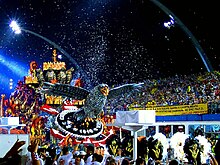Carnival of São Paulo
- Machine translation, like DeepL or Google Translate, is a useful starting point for translations, but translators must revise errors as necessary and confirm that the translation is accurate, rather than simply copy-pasting machine-translated text into the English Wikipedia.
- Do not translate text that appears unreliable or low-quality. If possible, verify the text with references provided in the foreign-language article.
- You must provide copyright attribution in the edit summary accompanying your translation by providing an interlanguage link to the source of your translation. A model attribution edit summary is
Content in this edit is translated from the existing Portuguese Wikipedia article at [[:pt:Carnaval da cidade de São Paulo]]; see its history for attribution. - You may also add the template
{{Translated|pt|Carnaval da cidade de São Paulo}}to the talk page. - For more guidance, see Wikipedia:Translation.

The Carnival of São Paulo (Portuguese: Carnaval de São Paulo) is a major Brazilian Carnival. It features a parade of Samba schools and takes place in the Anhembi Sambadrome of São Paulo on the Friday and Saturday night of the week of Carnival.[1] It is currently considered one of Brazil's biggest and most important popular events.
History
The origins of Carnival stem from a game from the 15th century in which people would throw water and other liquids at each other. [2] Since then, it has evolved and taken different forms in the various places it has spread to. São Paulo was heavily influenced by the people who migrated from the countryside to the city, as well as by the context of the coffee sector crisis.3 Therefore, the population of São Paulo was the result of the rural exodus caused by the coffee crisis that triggered the beginning of the São Paulo Carnival.
The Carnival celebrations and the samba itself in São Paulo are slightly different from the Carnival in the city of Rio de Janeiro, though there is a clear difference in the rhythm of the sound - in other words, the speed and tempo of the music. Samba artists from São Paulo were accustomed to difficult lives on the coffee plantations and migrated to the city in search of labour work. The São Paulo author and journalist Plínio Marcos called São Paulo's samba "the samba of work, hardship, drawn to the drumming", which contrasted greatly with the lyricism and cadence of carioca samba from Rio de Janeiro.
Queens of Carnival
|
| ||||||||||||||||||||||||||||||||||||||||||||||||||||||||||||||||||||||||||||||||||||||||||||||||||||||||||||||||
References

- ^ Francisco de Assis Santana Mestrinel (Chico Santana), "O samba e o carnaval paulistano"
- ^ [1]
- ^ [2]
- ^ [3]
- ^ [4]
- ^ [5]
- ^ Queens of Carnival 2007
- ^ Queens of Carnival 2008
- ^ Queens of Carnival 2009
- ^ Queens of Carnival 2010
- ^ Queens of Carnival 2011
- ^ Queens of Carnival 2012
- ^ Queens of Carnival 2013
- ^ Queens of Carnival 2014
- ^ Queens of Carnival 2016
- ^ Queens of Carnival 2017
- ^ Queens of Carnival 2018
- ^ Queens of Carnival 2019
- ^ Queens of Carnival 2023
- ^ Queens of Carnival 2024
- v
- t
- e
 | This article related to the culture of Brazil is a stub. You can help Wikipedia by expanding it. |
- v
- t
- e
 | This geographical article relating to the state of São Paulo is a stub. You can help Wikipedia by expanding it. |
- v
- t
- e











